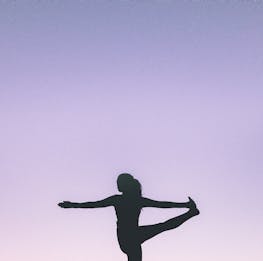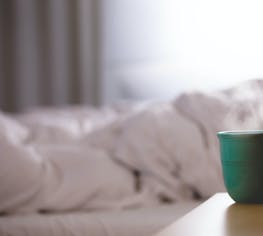Ernest Hemingway famously said, 'I love sleep. My life has the tendency to fall apart when I'm awake, you know?'
Modern society leads us to believe that sleep is more of a luxury than a necessity, and that to be highly productive, we need to compromise on sleep. Why We Sleep argues that sleep is one of the most crucial things we can do for health and wellness. It improves memory, increases muscle memory, and it enhances creativity.
It seems obvious that human beings need sleep, particularly because we spend over a third of our lives sleeping. But, sleep deprivation is now an epidemic. Over 65% of the adult population in developed nations, fail to get the recommended 7-9 hours of sleep each night. According to Walker, there's a worrying culture of praising poor sleeping habits, and misunderstanding sleep avoidance for a keen work ethic.
Have you ever heard someone bragging about pulling an all-nighter? This might make you feel like you're missing out, or not working hard enough. But, it's essential to realize that they're the ones who have missed out on a full replenishing night of sleep. Dr. Walker says what's actually worth bragging about: is having the kind of sleep where you wake up feeling like your best self. You should wake up with the ability to concentrate fully, remember information, and not be pestered by unregulated hunger hormones.
If that's not enough to convince you of sleep's importance, then how's this for a fun fact: men who sleep less than 5 hours per night, have significantly smaller testicles than those who sleep 7 hours or more. Women aren't off the hook either, because a lack of sleep reaps equivalent havoc in female reproductive health. Sleep is like the charging port for the brain and body. Nobody can function optimally without the battery power we get from a full, restorative night's sleep.
This brief summary looks at why we know so little about sleep, and why we take it for granted. Sleep is the subject that keeps author Matthew Walker up at night - somewhat ironically. So, in his groundbreaking book Why We Sleep, Dr. Walker promotes the idea that falling into a deep sleep each night is arguably the most critical thing we can do for our overall health. With a focus on science and biology, Walker explores sleep, how to get enough of it, and how to adjust our thinking about its necessity to both health and wellness.
The Science Behind Sleep
Did you know that you cycle through different types of sleep each night? When you fall into slumber, your brain cycles between three types of sleep, known as deep sleep, light sleep, and dream sleep. Each cycle is about 90 minutes.
Deep sleep is the first stage of our sleep cycle, and it's vital when it comes to memory. During the day, our brain temporarily stores information in a region called the hippocampus. Deep sleep acts as a delivery service, moving information from the hippocampus, to different brain regions for longer-term storage. Falling into a deep sleep is a crucial time for your brain to hit the save button when it comes to memory. Without deep sleep, you risk forgetting important information that you gained throughout the day.
Next comes light sleep. This is when the brain goes into cleaning mode. As with any cleaning, light sleep helps to rid your mind of any unnecessary memories and mental trash. In a sense, it gives your brain a kind of mental refresh, leaving you ready to soak in all that you need to, for the following day ahead.
Light sleep may seem unimportant or less effective than deep sleep, but numerous studies show just how essential light sleep actually is. In one particular study by Dr. Walker, university students were split into two groups. One group was asked to stay up all night, and the other had to get a full night's sleep. The following day, Walker had them study some new facts, and then asked them to get two full nights of sleep. After two full nights of sleep, he then tested how many facts the students could recall. The all-nighters recalled a significant 40% fewer facts than those who slept. Dr. Walker says that those who failed to get enough light sleep, didn't have the space to retain new facts. This tells us that not getting light sleep could be the difference between acing, or failing a test.
Dream sleep, is also known as, rapid eye movement sleep, or REM for short. This is the stage where you have your most vivid dreams. At this point in the sleep cycle, your body becomes almost paralyzed, but your eyeballs start to scurry rapidly under your eyelids. During this period, your brain is hard at work, strengthening valuable connections, and forging new neural pathways. This is how we make sense of the world and come to creative breakthroughs.
Each of these sleep cycles has a specific purpose, and losing out on any of our sleep cycles is costly. It can compromise our ability to learn, as well as remember and understand information. But, all human brains are different and some of us function better on certain patterns. Dr. Walker describes two kinds of people when it comes to sleeping... larks, and owls.
Sleep is a Vital Biological Function
Like it or not, we all need to sleep, and we all have an inner body clock, which we call the circadian rhythm. This is why we feel awake during the day, and then feel the need to sleep at night. However, sleep patterns can vary, making you either a lark or an owl.
If you're a lark, you like an early start, and produce your best work during the early part of the day. However, if you're an owl, then you like to sleep in, and tend to thrive best in the evening. Because society is mostly morning orientated, this gives larks a bit of an advantage, and can leave night owl's feeling slightly out of sync.
This is particularly noteworthy for teenagers, who generally tend to be night owls because of their circadian rhythms at this stage of their lives. So, it might not be that teenagers are lazy in the morning: they may just be tired and groggy.
This makes one wonder whether schools should start as early as they do? Regardless of age or sleep patterns, it's critical that we all get the recommended 7-9 hours of sleep. And, Dr. Walker argues that we need to sleep as if our life depends on it; because it really does.
Sleep Is Critical for Your Brain, Body and for Those Around You
Sleep isn't just critical for being more effective at work or studying, sleep deprivation significantly increases your risk of getting serious health problems. Without enough sleep, you're at more risk of Alzheimer's or heart disease. Furthermore, sleep and immunity go hand in hand. There are important neurons known as natural killer cells that are like secret service agents. Natural killer cells attack, and eliminate any dangerous and unwanted elements in the body. Studies show that if we only get 4 hours of sleep a night, there's a staggering 70% drop in these natural killer cells. So the less time you sleep, the shorter your life might be.
It's not only about your own health and wellness, it's about how your lack of sleep can impact those around you. Drowsy drivers are as much a threat as drunk drivers. A study showed that those who had been awake for 19 hours, did as poorly as drunk drivers on a concentration test. If you deny your body its sleep at night, it rebels during the day.
Sleep deprivation results in a phenomenon known as microsleep. These are short bursts of sleep that last only a quick second or two, but you lose motor control over your body for that time. These bursts are particularly dangerous while driving, operating machinery, or undertaking complicated tasks. So, remember that a good night's sleep isn't just for your own benefit, but for the safety of others.
Tips for a Restful Night of Sleep
According to Walker, maintaining a sleep schedule and routine is very important. The key is to keep the same waking and sleeping time each day. An erratic sleep schedule can disrupt your sleep quality.
Exercise also plays a big part in encouraging a restful night's sleep, and it also increases the quality of your sleep. However, make sure you workout at least 2-3 hours before going to bed. Limit alcohol, caffeine, and long naps after 3 pm. When it comes to your bedroom, lower the room temperature, reduce noise, and switch off screens and other bright lights.
Reducing exposure to lights before sleep is vital, and there's a good reason for this. Melatonin is a hormone that regulates our circadian rhythm, which is responsible for triggering the first sleep cycle. Melatonin gives us that push we need, to fall into a deep sleep, but the blue spectrum of light suppresses it. Even small light sources, such as a bedside lamp, can reduce melatonin by 50%.
In Conclusion
There are many of us who are in denial about how much sleep we actually need. Dr. Walker explains that scientifically, to live a healthier and more productive life, we all need to be more attuned to our body's internal clock. This is the clock that tells us when to sleep, and how much we need to sleep.
Many highly successful people, such as Bill Gates, have adjusted their attitudes to sleep and pulling all-nighters and have realized that sleep isn't a sign of weakness or an expression of lack of enthusiasm. Dr. Walker explains that sleep isn't just a pillar of health; it's the foundation.
The good news is that sleep is free. We should reclaim our right to a full night's sleep, without feeling guilty or hedonistic.




